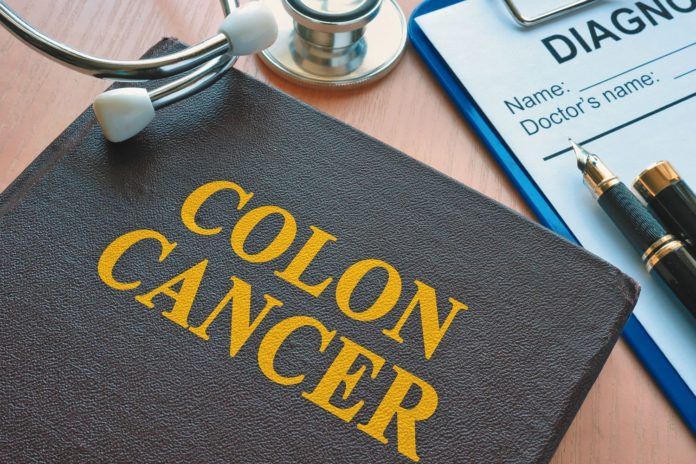Excluding skin cancers, colorectal cancer is the third most common cancer diagnosed in the US, with 140,000 new cases forecast for 2018. Research has linked dietary factors to colorectal cancer risk. Processed meats are associated with higher risk, whereas high-fiber diets are associated with lower risk, although it is unclear how this happens.
A new study in JAMA Oncology points to chronic inflammation as a possible common thread between diet and colorectal cancer risk. Researchers at Harvard found that people with dietary patterns most likely to cause inflammation were 32% more likely to develop colorectal cancer, compared with people with diets that had the least inflammatory potential. So-called “proinflammatory” diets in the study included foods such as red and processed meats, whereas diets rich in green leafy vegetables were considered potentially anti-inflammatory.
“This study adds to the previous evidence that inflammation is an important factor in colorectal cancer risk, and suggests that a dietary pattern with less potential to cause inflammation can lower the risk of colorectal cancer,” says Joel Mason, MD, director of the Vitamins and Carcinogenesis Laboratory at Tufts’ HNRCA. “However, an observational study such as this can’t prove it is the anti-inflammatory nature of the diet that conveys protection, since other properties of the diet may be responsible for its preventive effects.”
Inflammation and Colorectal Cancer: Some research has tied persistent, low-level inflammation in the body to a variety of chronic diseases, including colorectal cancer. Certain foods appear to be associated with more inflammation, as reflected by higher levels of chemical inflammation “markers” in the blood. The Harvard study relied on three common markers to assess the inflammatory potential of eating habits, and then related that to the risk for colorectal cancer.
Participants were from two long-term studies—the Nurses’ Health Study and the Health Professionals’ Follow-up Study. The study analyzed information on health and nutrition for more than 120,000 people, covering 26 years. The participants’ eating habits were evaluated for inflammatory potential based on 18 food groups and their influence on levels of inflammatory markers in the blood. This allowed the researchers to rate an individual’s diet on a scale from least to most potentially inflammatory.
Diets with the lowest inflammatory potential included tea, coffee, dark yellow vegetables and dark green and leafy vegetables—foods that are also generally considered healthy. In contrast, diets rated with the highest inflammatory potential included processed meat, red meat, organ meat and sugar-sweetened carbonated beverages.
Gender Gap: The study found some differences in risk between men and women. For men and women combined, diets with the highest inflammatory potential were associated with a 32% higher risk of colorectal cancer, compared with the lowest inflammatory potential. In men only, the risk was 44% higher, and in women only it was 22% higher.
Overweight or obese men consuming diets with the most inflammatory potential were 48% more likely to develop colorectal cancer over the study period, compared with those consuming diets with the least inflammatory potential.
In lean men, poor dietary patterns were also associated with greater risk, but slightly less so than in overweight or obese men.
In women, the inflammatory potential of the diet in overweight or obese women did not increase or decrease risk of colon cancer. However, lean women consuming the most potentially inflammatory diets had 31% higher risk of colorectal cancer, compared with those who consumed the least inflammatory diets.
Study lead author Fred K. Tabung, MSPH, PhD, of the Harvard T. H. Chan School of Public Health, says the apparent higher risk associated with a potentially proinflammatory diet in lean woman may be linked to the influence of different sex hormones, although the study was not designed to answer this question.
What It Means For You: Studies to date suggest that being physically active and maintaining a healthy weight is associated with lower risk of colorectal cancer. The Harvard study emphasizes the importance of also eating an overall healthy diet. Says Tabung, “That pattern would be high in green leafy vegetables, particularly dark-colored ones, and low in red and processed meat, refined grains, and sugar-sweetened beverages.” And this dietary pattern is also consistent with lower risk of heart disease and other chronicdisorders.
-Get screened: Regular screening for pre-cancerous growths in the colon and rectum, beginning at age 50, can prevent colorectal cancer. The US Preventive Services Task Force recommends that adults age 50 to 75 be screened for colorectal cancer and that adults age 76 to 85 ask their doctor if they should be screened.
-Follow a healthy dietary pattern: Eat a diet rich in dark green leafy vegetables as well as dark yellow vegetables, and low in red and processed meat, refined grains, and sugar-sweetened beverages.

























What are the three markers?